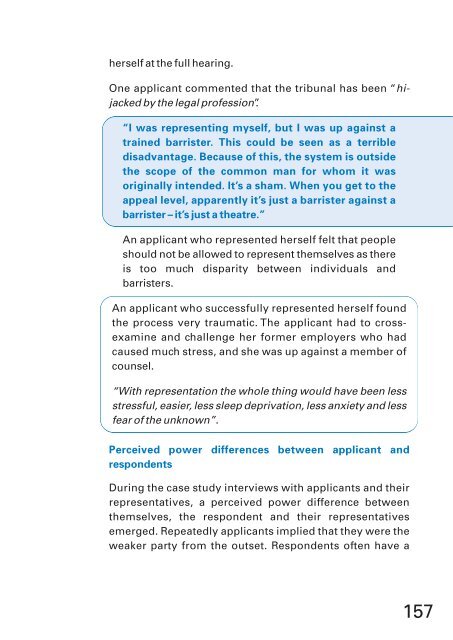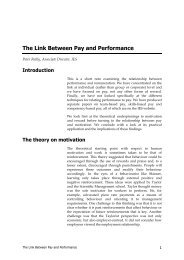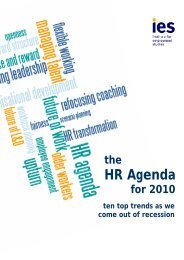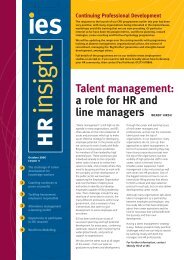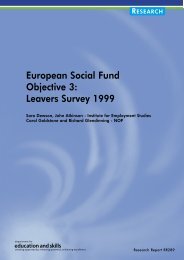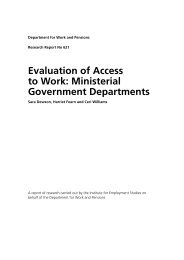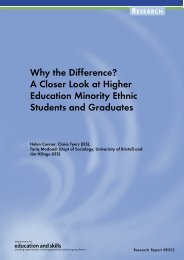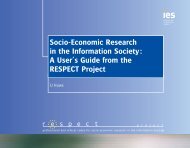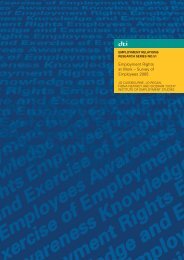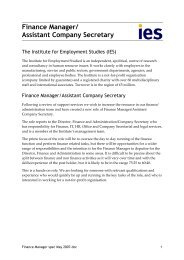- Page 1 and 2:
Monitoring the Disability Discrimin
- Page 3 and 4:
Acknowledgements We would like to t
- Page 5 and 6:
2.2.4 Identification of potential P
- Page 7 and 8:
4.6 Respondents’ views on decisio
- Page 9 and 10:
7.3 Impact on respondent organisati
- Page 11 and 12:
treatment 308 9.3.3 Meaning of disc
- Page 13 and 14:
■ Access to justice, including ac
- Page 15 and 16:
epresentation that they ended up re
- Page 17 and 18:
are resolved without the need for a
- Page 19 and 20:
the outcome. The main factors ident
- Page 21 and 22:
if they were successful at tribunal
- Page 23 and 24:
or the Sheriff’s Court. The pauci
- Page 25 and 26:
ecause defendants tend not to dispu
- Page 27 and 28:
2. Introduction 2.1 Background and
- Page 29 and 30:
levels of all parties. ■ The char
- Page 31 and 32:
Key findings from the phase 1 and 2
- Page 33 and 34:
■ Applicants are less likely than
- Page 35 and 36:
definition of disability and the me
- Page 37 and 38:
industrial relations journals and s
- Page 39 and 40:
lawyers’ associations and societi
- Page 41 and 42:
of actual cases to date. ■ The re
- Page 43 and 44:
how the sample of interviews/case s
- Page 45 and 46:
Table 2.8: Part II case studies, by
- Page 47 and 48:
2.3 Key findings from the case law
- Page 49 and 50:
Other recent clarifications cover l
- Page 51 and 52:
employer to show that it was unreas
- Page 53 and 54:
and the impact of Part III cases on
- Page 55 and 56:
3.1.1 Dismissal cases Amongst the c
- Page 57 and 58:
An applicant had worked for a retai
- Page 59 and 60:
An applicant was not offered an int
- Page 61 and 62:
espondents, and their representativ
- Page 63 and 64:
“I always felt the guy with one l
- Page 65 and 66:
An applicant with depression and an
- Page 67 and 68:
the HR function was less clearly de
- Page 69 and 70:
etween this and the extent to which
- Page 71 and 72:
“In a sense it is quite naïve re
- Page 73 and 74:
their working environment. Financia
- Page 75 and 76:
over taking a case. Evidence The av
- Page 77 and 78:
potential applicants (ie people who
- Page 79 and 80:
An applicant working for a local au
- Page 81 and 82:
appeal initially would do less to w
- Page 83 and 84:
An applicant had meetings with the
- Page 85 and 86:
the case studies there were indeed
- Page 87 and 88:
cases were not in a position to use
- Page 89 and 90:
Note: There are two important diffe
- Page 91 and 92:
4.1.5 Withdrawn and settled cases
- Page 93 and 94:
One applicant involved in a less fa
- Page 95 and 96:
An applicant involved in a claim ag
- Page 97 and 98:
phonecalls and home visits. Some co
- Page 99 and 100:
expectations, conflicting medical e
- Page 101 and 102:
A trade union representative involv
- Page 103 and 104:
number of problems for representati
- Page 105 and 106:
An applicant with depression bringi
- Page 107 and 108: An applicant pursuing a recruitment
- Page 109 and 110: 4.3.6 Procedural/technical factors
- Page 111 and 112: espondents, who commonly attach a
- Page 113 and 114: figure was a problem particularly f
- Page 115 and 116: An applicant involved in a settled
- Page 117 and 118: 4.7 Conclusion To summarise, then,
- Page 119 and 120: form of application is known as an
- Page 121 and 122: IT1 arrived they were expecting it.
- Page 123 and 124: In this section we look at some exa
- Page 125 and 126: prohibitively expensive for many ap
- Page 127 and 128: No knowledge of applicant’s disab
- Page 129 and 130: However, some respondents were awar
- Page 131 and 132: An applicant who was dismissed from
- Page 133 and 134: There is no clear pattern in the re
- Page 135 and 136: The vagaries of the tribunal proces
- Page 137 and 138: Employment Code of Practice, DRC li
- Page 139 and 140: applicants who had taken DDA cases,
- Page 141 and 142: An applicant who is registered blin
- Page 143 and 144: elieved that this contributed to th
- Page 145 and 146: full tribunal hearing; thirteen cas
- Page 147 and 148: Table 6.3: Outcomes, by applicant
- Page 149 and 150: In our case studies, four out of si
- Page 151 and 152: “At the end of the day I knew dis
- Page 153 and 154: medical reports can become a barrie
- Page 155 and 156: A lack of supporting witnesses was
- Page 157: solicitor would have been better, a
- Page 161 and 162: the way the tribunal handed and dec
- Page 163 and 164: the chair makes a real difference,
- Page 165 and 166: that depression was not taken serio
- Page 167 and 168: An applicant received an award in e
- Page 169 and 170: 7. Impact of DDA 7.1 Introduction T
- Page 171 and 172: substantial legal fees for advice o
- Page 173 and 174: the outcome. For those who lost the
- Page 175 and 176: Family and friends featured heavily
- Page 177 and 178: Stress Many applicants, both those
- Page 179 and 180: Impact of being defined as ‘disab
- Page 181 and 182: whose cases were successful, though
- Page 183 and 184: e there. A common theme to emerge d
- Page 185 and 186: process of taking a case can have a
- Page 187 and 188: A man with rheumatoid arthritis who
- Page 189 and 190: epresentation. Although this partic
- Page 191 and 192: The case studies provided, overall,
- Page 193 and 194: A local authority involved in an on
- Page 195 and 196: A local council was forced to settl
- Page 197 and 198: The director of a small independent
- Page 199 and 200: Cynicism Although many respondents
- Page 201 and 202: “We’ve been trying really hard
- Page 203 and 204: The HR manager for a university whi
- Page 205 and 206: the lives of applicants and the run
- Page 207 and 208: 8. Part III Case Studies In this ch
- Page 209 and 210:
number of ways. Specifically a serv
- Page 211 and 212:
a particular factor was perceived b
- Page 213 and 214:
Intense feeling of humiliation Seve
- Page 215 and 216:
their own child but trying to make
- Page 217 and 218:
- failing to amend policies, proced
- Page 219 and 220:
Claimants’ awareness of rights un
- Page 221 and 222:
cases were never pursued. This is d
- Page 223 and 224:
active in disability rights or advo
- Page 225 and 226:
Act at the time of the incident eit
- Page 227 and 228:
A representative commented that she
- Page 229 and 230:
“It’s not like he never gets to
- Page 231 and 232:
The meeting appeared to be going we
- Page 233 and 234:
III cases than in Part II cases. Oc
- Page 235 and 236:
hearing and six had never been lodg
- Page 237 and 238:
equipment. Whether the investment i
- Page 239 and 240:
defendant or potential defendant wa
- Page 241 and 242:
large as in Part II cases. At the s
- Page 243 and 244:
Consequently, commentary on Part II
- Page 245 and 246:
she did have a physical impairment,
- Page 247 and 248:
detailed diagnosis of mental illnes
- Page 249 and 250:
Session confirmed that the tribunal
- Page 251 and 252:
almost exclusively by women (or men
- Page 253 and 254:
disabled person’ and that use of
- Page 255 and 256:
of the panel who experienced mild i
- Page 257 and 258:
she was receiving psychotherapy. A
- Page 259 and 260:
Mere diagnosis of a progressive con
- Page 261 and 262:
faced by applicants called upon to
- Page 263 and 264:
evidence is obtained by the parties
- Page 265 and 266:
terminated. In Relaxion Group plc v
- Page 267 and 268:
of the employment contract. Their L
- Page 269 and 270:
The EAT revisited the issue in Cath
- Page 271 and 272:
of making the application. It comme
- Page 273 and 274:
mobility, she would be unable to fo
- Page 275 and 276:
disabled person's disability. The C
- Page 277 and 278:
was criticised for failing to draw
- Page 279 and 280:
whether non-payment of sick pay to
- Page 281 and 282:
The Court of Appeal disapproved thi
- Page 283 and 284:
echoes the Code of Practice for Emp
- Page 285 and 286:
considering the evidence as a whole
- Page 287 and 288:
from the GP's certificate that the
- Page 289 and 290:
London Borough of Hammersmith 1 tha
- Page 291 and 292:
steps that might be regarded as rea
- Page 293 and 294:
set out in the early case of Morse
- Page 295 and 296:
Breach of the duty to make reasonab
- Page 297 and 298:
despite the omission of Morse. Furt
- Page 299 and 300:
In Farley v H. M. Prison Service 1
- Page 301 and 302:
adjustments is an objective questio
- Page 303 and 304:
material and substantial. If not sa
- Page 305 and 306:
unreasonably in relation to his dut
- Page 307 and 308:
of Appeal, the appellant alleged th
- Page 309 and 310:
(e) banking or insurance facilities
- Page 311 and 312:
on less favourable treatment brough
- Page 313 and 314:
Act, and to an example of less favo
- Page 315 and 316:
(a) remove the feature; (b) alter i
- Page 317 and 318:
court agreed that neither option av
- Page 319 and 320:
(c) refusal or deliberate non-provi
- Page 321 and 322:
These provisions apply to owners wh
- Page 323 and 324:
was common ground that she was fell
- Page 325 and 326:
Appendix: Interview Topic Guides Ap
- Page 327 and 328:
1. Introduction 1.1 Explain project
- Page 329 and 330:
3.1 Are they aware of any changes o
- Page 331 and 332:
jurisdictions to succeed at tribuna
- Page 333 and 334:
4. Issues relating to Part III of t
- Page 335 and 336:
■ timing — dates by which cases
- Page 337 and 338:
case in question (rather than simpl
- Page 339 and 340:
■ was there any attempt to resolv
- Page 341 and 342:
these parties; and ■ if satisfied
- Page 343 and 344:
Overall, how satisfied were they wi
- Page 345 and 346:
case in question (rather than simpl
- Page 347 and 348:
■ Were they in receipt of advice
- Page 349 and 350:
■ conciliators (egACAS) ■ any i
- Page 351 and 352:
■ handled case; ■ decided case;
- Page 353 and 354:
4. Case-Study Discussion Guide:Advi
- Page 355 and 356:
Ask interviewee to describe the nat
- Page 357 and 358:
person in comparison with other per
- Page 359 and 360:
4.1.4 Heard cases Establish (or con
- Page 361 and 362:
solicitors/advisors; ■ unwillingn
- Page 363 and 364:
the potential representative if app
- Page 365 and 366:
from whom, and how did this advice
- Page 367 and 368:
■ Do they still feel that the dec
- Page 369 and 370:
case or potential case, attempt, wh
- Page 371 and 372:
occurred, and any relevant backgrou
- Page 373 and 374:
the potential applicant (eg their o
- Page 375 and 376:
case in question (rather than simpl
- Page 377 and 378:
happened as a result? ■ Was there
- Page 379 and 380:
eceived (cost, availability etc)? I
- Page 381 and 382:
physical aspects of the premises, b
- Page 383 and 384:
case in question (rather than simpl
- Page 385 and 386:
■ Were they in receipt of advice
- Page 387 and 388:
availability, lack of awareness etc
- Page 389 and 390:
Does the organisation have an EO or
- Page 391 and 392:
egard as important or relevant. Whe
- Page 393 and 394:
sources: especially DRC or Equality
- Page 395 and 396:
Timing of settlement (egbefore the
- Page 397 and 398:
■ application of the “justifica
- Page 399:
You can contact the DRC Helpline by


